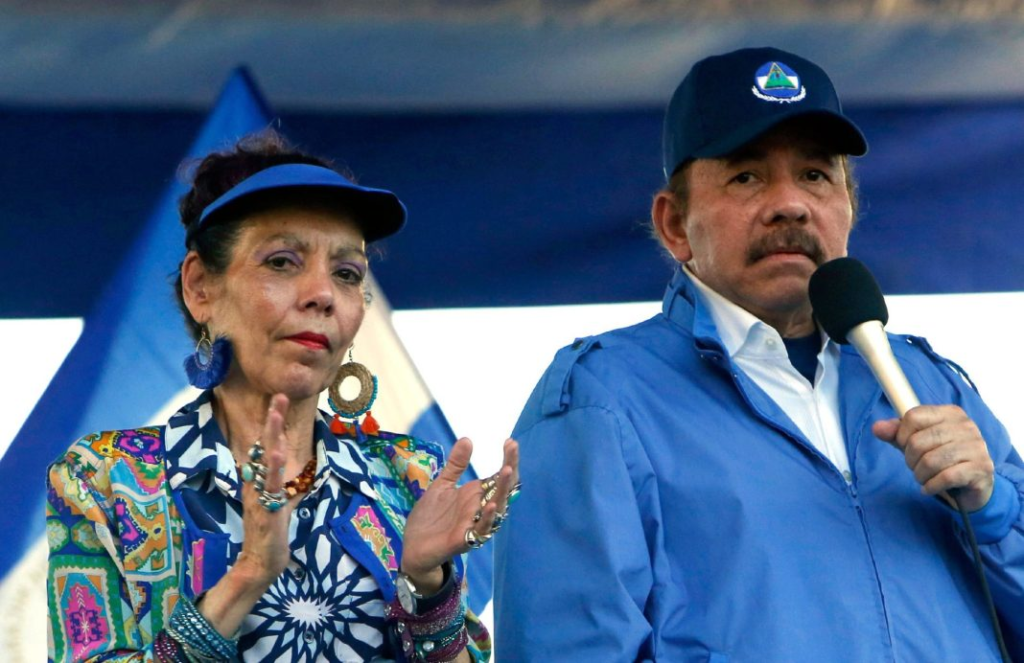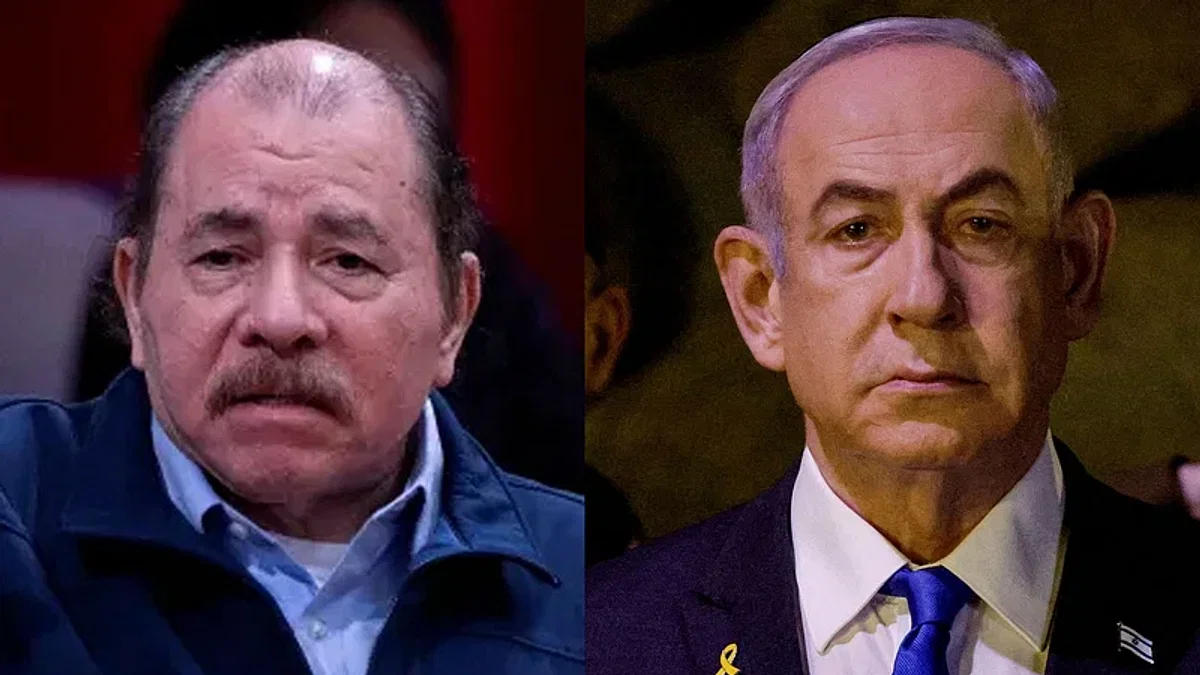On October 11, Nicaragua announced its decision to break diplomatic relations with Israel. This move comes amid rising tensions in the Middle East, particularly in Gaza, and is a reflection of Nicaragua’s longstanding support for the Palestinian cause.
The decision, while largely symbolic, adds to Israel’s growing isolation on the global stage and demonstrates Nicaragua’s stance in the ongoing West Asian conflict.
Nicaragua’s Break with Israel: A Symbolic Gesture
Nicaragua’s announcement to sever diplomatic ties with Israel was made public by Vice President Rosario Murillo, who is also the wife of Nicaraguan President Daniel Ortega. The move follows a resolution passed by Nicaragua’s Congress, which came on the heels of the one-year anniversary of the Gaza war that began on October 7, 2022.
Read : Nicaragua: Hidden Treasures of the Land of Lakes and Volcanoes
In her announcement, Murillo referred to Israel as a “fascist and genocidal government,” echoing strong rhetoric that has been common among leftist governments in Latin America in their critique of Israel’s policies toward the Palestinians.
Read : Israeli Foreign Minister Threatens Iran, Saying It ‘Deserves to Be Destroyed’
Despite the strong language used by Nicaragua, the practical impact of this diplomatic severance is minimal. As noted by Al Jazeera, Israel does not have a resident ambassador in Nicaragua’s capital, Managua, and diplomatic relations between the two nations have been nearly non-existent for some time.
However, the move is important in its symbolism, as it aligns Nicaragua with other Latin American nations that have taken similar steps in recent months.
Nicaragua’s decision to break ties with Israel is not an isolated case. Other Latin American countries with leftist governments, including Colombia, Chile, and Bolivia, have also cut or downgraded their diplomatic relations with Israel in recent years.
These nations, known for their traditionally leftist political ideologies, have been vocal supporters of the Palestinian cause and have routinely condemned Israel’s actions in Gaza and the broader West Asian conflict.
Latin America’s Support for the Palestinian Cause
Nicaragua’s decision to break ties with Israel is part of a broader trend in Latin America, where countries with left-leaning governments have consistently voiced support for the Palestinian cause.
This support is rooted in historical, ideological, and political factors, with many Latin American leaders viewing the Palestinian struggle as a parallel to their own struggles against imperialism and foreign intervention.

Countries such as Chile, Colombia, and Bolivia have been particularly vocal in their condemnation of Israel’s actions in Gaza. These nations have framed the Israeli-Palestinian conflict as a human rights issue, criticizing Israel for its military actions and expressing solidarity with the Palestinian people.
Nicaragua, under the leadership of Daniel Ortega, has positioned itself as a staunch advocate for de-escalation in the Middle East and has repeatedly condemned what it views as Israeli aggression.
Earlier this year, Nicaragua took a more formal step in its opposition to Israeli actions by submitting a request to the International Court of Justice (ICJ) to halt German arms sales to Israel. This request, made in April, was ultimately rejected by the court, but it demonstrated Nicaragua’s willingness to take legal action in defense of the Palestinian cause.
Nicaragua’s government framed the case as an attempt to hold countries accountable for their role in fueling the conflict through arms sales. Although the ICJ did not take up the case, Nicaragua’s actions showcased its commitment to pursuing international avenues for peace and justice in the region.
The recent announcement of breaking diplomatic ties with Israel is thus a continuation of Nicaragua’s broader foreign policy approach toward the Middle East.
The country’s government has consistently called for an end to violence and a peaceful resolution to the conflict, positioning itself as a vocal critic of Israel’s policies and a defender of Palestinian rights.
Implications for Israel’s Global Position
Nicaragua’s decision to cut ties with Israel is part of a growing trend of diplomatic isolation for Israel on the global stage, particularly in Latin America and among countries sympathetic to the Palestinian cause.
As the conflict in Gaza continues to escalate, Israel faces increasing criticism from the international community, particularly over its military actions in Palestinian territories.
The announcement by Nicaragua follows similar moves by other Latin American countries, including Chile and Bolivia, which have taken steps to distance themselves from Israel diplomatically.
This isolation is compounded by criticism from other regions, as countries in the Middle East and parts of Europe have also expressed concern over Israel’s policies in Gaza and the West Bank.

The decision by Nicaragua to sever ties with Israel may not have immediate, tangible effects on Israel’s diplomatic relations, but it adds to the narrative of growing global opposition to Israel’s handling of the Palestinian issue.
In particular, it underscores the divide between Israel and countries with left-leaning governments that have traditionally supported the Palestinian cause.
The timing of Nicaragua’s decision is also significant, as it comes amid the broader context of Israel’s war in Gaza, which has drawn widespread condemnation from the international community.
Nicaragua has been particularly vocal in its opposition to the ongoing conflict, condemning what it views as Israeli aggression not only in Gaza but also in other parts of the Middle East.
In her announcement, Vice President Rosario Murillo highlighted the expansion of the conflict beyond Gaza, noting that the fighting “extends against Lebanon and gravely threatens Syria, Yemen, and Iran.”
This broader regional context has been a key concern for Nicaragua, which has positioned itself as a proponent of peace and de-escalation in the region. The Nicaraguan government has framed its decision to break ties with Israel as part of its broader effort to reduce violence and bring about a peaceful resolution to the conflict.
As the situation in Gaza continues to deteriorate, Israel faces mounting challenges in maintaining its diplomatic relations with countries around the world. Nicaragua’s decision to cut ties is a reminder that Israel’s global position is becoming increasingly precarious, particularly as more countries express their opposition to its actions in the West Asian conflict.
Nicaragua’s decision to sever diplomatic relations with Israel is a reflection of its longstanding commitment to supporting the Palestinian cause and advocating for peace in the Middle East. While the move is largely symbolic, it sends a clear message about Nicaragua’s position in the ongoing conflict and its broader foreign policy goals.

Under the leadership of Daniel Ortega, Nicaragua has consistently called for de-escalation in the region and has taken steps to challenge what it views as Israeli aggression. The country’s legal action at the International Court of Justice earlier this year, coupled with its decision to cut ties with Israel, highlights its commitment to pursuing international avenues for justice and peace.
As the conflict in Gaza continues, Nicaragua’s actions serve as a reminder of the growing global divide over the Israeli-Palestinian issue. Countries with left-leaning governments, particularly in Latin America, have increasingly aligned themselves with the Palestinian cause and have taken steps to distance themselves from Israel.
Nicaragua’s decision to break diplomatic relations is the latest example of this trend, adding to Israel’s growing diplomatic isolation. Despite the symbolic nature of Nicaragua’s move, it underscores the challenges that Israel faces in maintaining its global relationships, particularly as the conflict in Gaza continues to escalate.
Nicaragua’s commitment to peace and its opposition to violence in the Middle East will likely continue to shape its foreign policy in the years to come, as it seeks to play a role in advocating for a peaceful resolution to the Israeli-Palestinian conflict.

